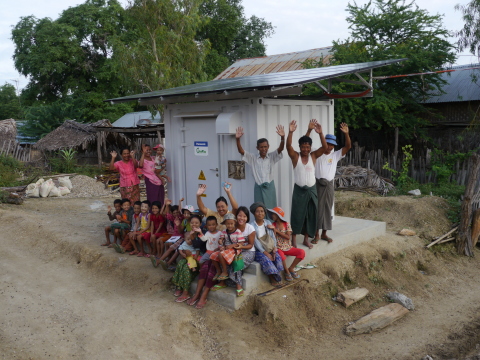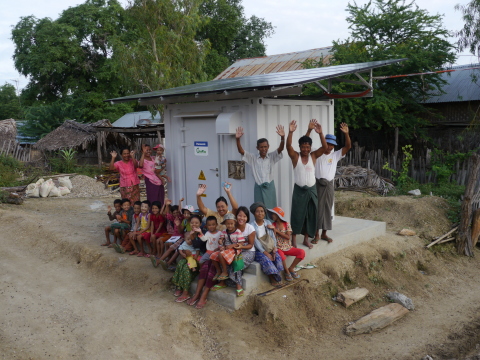OSAKA, Japan--(BUSINESS WIRE)--Panasonic Corporation provided the Power Supply Station; a stand-alone photovoltaic power package, to the village of Yin Ma Chaung, a Magway Region of the Republic of the Union of Myanmar. The Power Supply Station is installed as part of a CSR effort by the Sustainable Alternative Livelihood Development Project, supported by the Mae Fah Luang Foundation under Royal Patronage (MFL Foundation) of the Kingdom of Thailand. This project was rolled out in partnership with Mitsui & Co., Ltd as one of their CSR activities, and funded by donations to support the mission of the MFL Foundation's activities.
Panasonic’s power supply station consists of solar modules and storage batteries, which enables energy to be created, stored and managed efficiently. The whole system is able to supply electricity to the entire village, relieving approximately 140 households in the non-electrified mountainous village by powering up electrical appliances and lights, which are essential and important in daily lives.
The presence of lightings in the village makes it possible for villagers to move around during the night, as prior to that; they were unable to do so since the area is inhabited by poisonous snakes. In addition, all the street lights have time-switch LED bulbs that could also make use of limited electricity, efficiently.
In Myanmar, its off-grid areas are said to be at the highest level among the ASEAN countries, at approximately 68%1 across the nation. In its countryside, the number reaches to an estimate of 84%2 households being unconnected to electricity. To step up on its efforts, Panasonic also installed a refrigerator in the village’s meeting area to store anti-venom drugs. With a well-powered point, the meeting area has thus serves as a center for welfare, entertainment and other purposes.
The whole initiative aimed to provide additional electricity to surrounding villages as well; contributing to the entire Yenan Chuang Township.
Panasonic will continue to develop localized solutions in its bid to provide electricity to off-grid regions and improves the standard of living amongst communities, around the world.
|
Delivery specifications |
||
|
Name |
Stand-alone photovoltaic power package “Power Supply Station” | |
|
Solar modules |
Heterojunction photovoltaic module HIT® 3 x 12 | |
|
Maximum generation |
2.82 kW | |
|
Storage batteries |
12V/60Ah Deep cycle valve-regulated lead-acid battery x 24 | |
|
Maximum power |
17.2 kWh | |
|
Control board |
Power supply main unit | |
|
Maximum inverter |
3 kW | |
|
Dimensions (mm) |
4,780 (W) x 3,452 (L) x 2,975 (H)
(Container: 2,400 (W) x 2,140 (L) x 2,300 (H)) |
|
|
Mass (including storage |
Approx. 2,650 kg | |
|
1. Source: World Energy Outlook 2015, International Energy Agency |
||
|
2. Source: The World Bank “Electricity to Transform Rural Myanmar” 16 September 2015 |
||
|
3. HIT is a registered trademark of the Panasonic Group in Japan. |
||
[Overview of the Power Supply Station stand-alone photovoltaic power package]
The Power Supply Station is equipped with twelve Panasonic HIT® 3 solar modules and can output approximately 3 kW of electricity. It is also equipped with 24 storage batteries (approximately 17 kWh), enabling it to supply stored power.
[Features of the Power Supply Station stand-alone photovoltaic power package]
(1) Stable quality and performance achieved by production at the factory
The
Power Supply Station was developed as a mass produced product to deliver
stable quality overseas. The unit for this project was manufactured and
its quality was controlled by our Thai subsidiary, Panasonic Eco
Solutions Steel (Thailand) Co., Ltd., before delivery to Myanmar.
(2) Simple and quick assembly for portability and expansion
The
station is designed to eliminate the need for on-site professional
construction work, allowing an electrical contractor to easily and
quickly install it.
(3) Utilization of proven Panasonic technologies
The station uses
Panasonic HIT® 3 solar modules to provide
power efficiently, even in restricted spaces. The company's newly
developed power supply main unit acts as the energy management system to
monitor the remaining electricity level of the lead-acid storage
batteries and controls supply and demand, reducing deterioration of the
batteries. This reduces the life-cycle cost and maintenance man-hours
for the storage batteries.
[Video]
Bringing safety to villages living in fear of venomous snakes-Power Supply Station-
- Channel Panasonic: http://channel.panasonic.com/contents/18919/
About Panasonic
Panasonic Corporation is a worldwide leader in the development of diverse electronics technologies and solutions for customers in the consumer electronics, housing, automotive, enterprise solutions and device industries. Since its founding in 1918, the company has expanded globally and now operates 474 subsidiaries and 94 associated companies worldwide, recording consolidated net sales of 7.553 trillion yen for the year ended March 31, 2016. Committed to pursuing new value through innovation across divisional lines, the company uses its technologies to create a better life and a better world for its customers. To learn more about Panasonic: http://www.panasonic.com/global.




